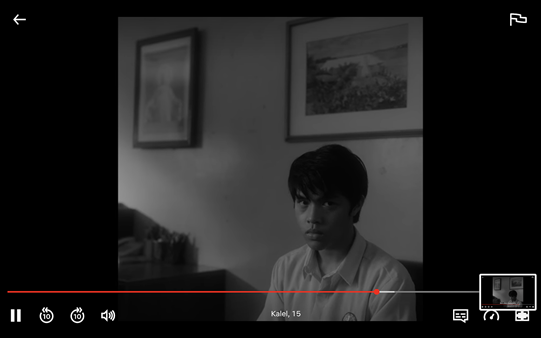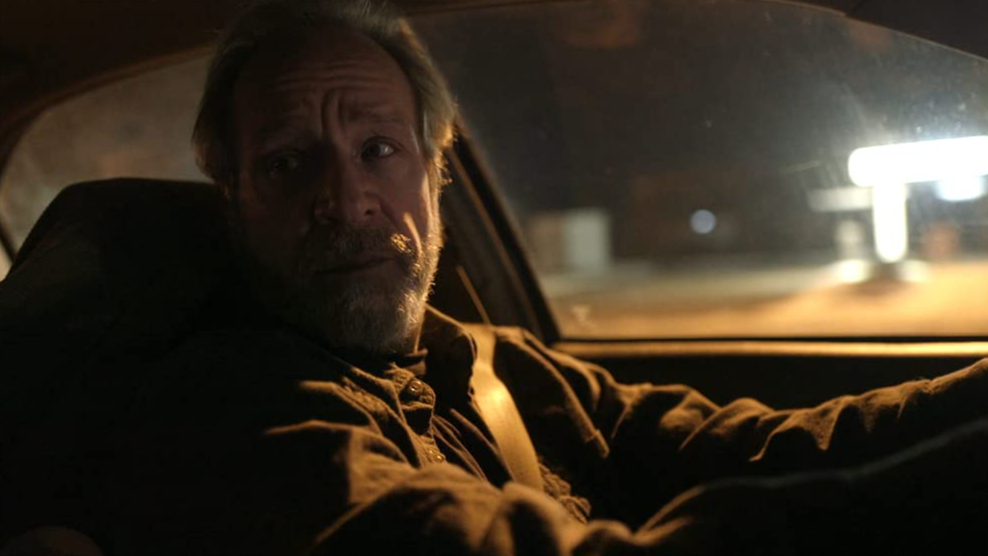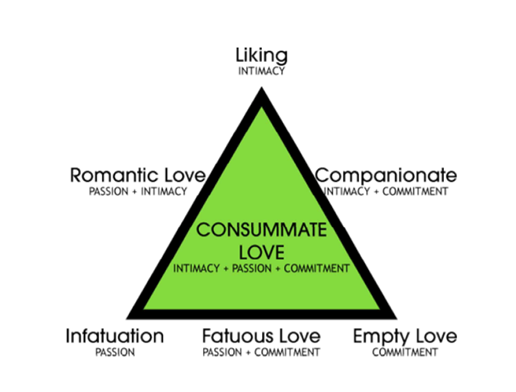The Grand Budapest Hotel (2014) follows a writer who is interested in the infamous hotel known as the Grand Budapest Hotel, which is no longer in its prime, and has since become run-down. The writer meets with the current owner of the hotel known as Zero Moustafa (F. Murray Abraham), whose story starts with him as a mere lobby boy. Zero talks the writer through his beginning years at the hotel, starting with Madame D (Tilda Swinton) as the owner who eventually leaves the hotel to Monsieur Gustave (Ralph Fiennes) when she is mysteriously murdered. Monsieur Gustave was a lover of Madame D and was accused of her murder when she passed, leaving him in prison. He eventually breaks out and works with the young Zero (Tony Revolori) to prove his innocence. Through the ups and downs of the film, Zero meets Agatha (Saoirse Ronan), a baker who works for Mendel’s Bakery. They fall in love and become engaged. At the end of the film, he explains to the writer that Monsieur Gustave and Agatha both have died. Monsieur Gustave was shot by the military and Agatha tragically fell ill and died from a disease.
Continue readingThe Grand Budapest Hotel Mise-en-Scene Scrapbook. By Carrie Goodison
Abby Walkur, Author of FM 12.1 (2021) Article “Three Cheers for the Essay Film: How Chris Marker’s Vive la baleine Epitomizes Timothy Corrigan’s Model”
![Whale picture from a textbook from the film Vive la baleine [Three Cheers for the Whale]](https://www.filmmattersmagazine.com/wp-content/uploads/2022/04/FM-12.1_1_art_Walkur_1-1024x642.png)
Film Matters: Please tell us about your article that is being published in Film Matters.
Abby Walkur: My article—“Three Cheers for the Essay Film”—utilizes esteemed scholar Timothy Corrigan’s essay film model to explain how famous French essayist Chris Marker’s Vive la baleine epitomizes the essay film mode.
Continue readingOpen Call for Papers 14.1
Film Matters is pleased to announce our open call for papers from current undergraduates, authors who have been invited to revise and resubmit previous submissions (including authors who did not make it past our prescreening for a previous call), and recently graduated undergraduates for consideration in issue 14.1 (2023).
The deadline is September 1, 2022.
Please note, Film Matters is now using MLA 9th edition style — so please prepare your submissions accordingly. Purdue OWL’s MLA Formatting and Style Guide is an excellent resource to consult for help with this.
For more information about this call for papers, please download the official document (PDF):
Submissions should include a cover sheet, which provides the author’s name, title of essay, institutional affiliation, and contact information; all other identifying information should be removed from the body of the text and the headers/footers in order to aid the blind peer review process.
Submissions and questions should be directed to:
- futurefilmscholars AT gmail.com
Please note that Film Matters does not accept submissions that are currently under review by other journals or magazines.
Please submit your film- and media-related research papers today! We look forward to receiving your work!
Chuyi Zhang, Author of FM 12.1 (2021) Article “Deconstructing the Other’s Other: Analyzing the Chinese Female Image in the Film Saving Face”
Film Matters: Please tell us about your article that is being published in Film Matters.
Chuyi Zhang: My article mainly focuses on the film Saving Face created in 2004 by Chinese American director Alice Wu, which carries a lot of meaning but does not catch as much attention as it should. From a film history perspective, it was the first Hollywood film centered on Chinese Americans’ experiences and stories since The Joy Luck Club. From the cultural studies perspective, it is a perfect case, where feminism, queer, ethnic and intercultural studies intersect altogether. However, it is not frequently mentioned in academia. The aim of my essay is to discuss and reveal how the director challenges the representation of Chinese in the dominant American narrative.
Continue readingThe Departed in Three Symbols. A Motif Analysis by Joey McDevitt
Dialogue is used to express what a character is thinking; however, it is a film’s visual aesthetic that subconsciously talks to the audience. In 2006, Martin Scorsese directed the film The Departed, which would win him his first Academy Award for directing; the film would also win Best Picture. The film follows two men, Colin Sullivan (Matt Damon) and Billy Costigan (Leonardo DiCaprio). Colin grew up under the supervision of Frank Costello (Jack Nicholson), who is in charge of the Irish-American mob in South Boston. Colin becomes a cop and acts as a mole for Frank, keeping him one step ahead of the police force. On the other hand, Billy joins the police force and is asked to go undercover in Frank’s crew. Eric Willis states in his article titled “The Departed”: “Scorsese’s film plays out the struggle between two kinds of betrayals. There is an irony in Costello delivering his punning advice to Costigan, the police informer in his midst, who is struggling to maintain his act as a member of Costello’s gang while driven by his own morality” (46). As you can probably imagine, things do not go according to plan when a mole and an undercover cop are operating on different terms. Death, power, and double-crossing are the foundation for this film and are expressed in different ways through visual motifs.
Continue readingThe 2021 Film Matters Masoud Yazdani Award for Excellence in Undergraduate Film Scholarship Winner
Film Matters is pleased to announce the winner of the seventh annual Masoud Yazdani Award: Lydia Spencer-Elliott for her FM 11.1 (2020) article, “Choreography to Choreocinema: The Symbiotic Relationship Between Surrealism and Dance.” Lydia recently graduated from the University of Exeter with a degree in both English Literature and Film Studies. She completed her journalism MA at City, University of London, and is now Acting Senior Features Writer at Grazia magazine.
This year’s judges also wish to recognize two other strong articles in the honorable mention category: Sarah Kazuko Chow for her FM 11.1 article “Anna May Wong: Navigating Asian American Racial Identity in Early Hollywood,” and Ben Werdegar for his “Forgotten Narrative of Palestine” FM 11.2 article. Sarah graduated from the University of Southern California in December 2021, where she majored in Film and Television Production. She hails from Oakland and is interested in writing, producing, and directing films that center on Asian American stories. Ben is a 2020 Stanford University graduate with a BA in Film and Media Studies, with an aesthetic focus on the use of music within visual media. Werdegar’s family has both Israeli and Palestinian heritage, which informs his interest in cinema that addresses the Israeli-Palestinian conflict.
This award would not be possible without the hard work of our judging panel. Therefore, we’d like to take a moment to acknowledge our 2021 judges:
Eleanor Gratz is a graduate student in the Film Studies Department at the University of North Carolina Wilmington.
Stephen Lambros is a graduate student born and raised in Wilmington, NC. He double-majored in creative writing and film studies at the University of North Carolina Wilmington and is currently pursuing a master’s degree in the university’s Film Studies program. Beyond his studies, he enjoys writing books and screenplays.
Saifey Maynor is a graduate student in the Film Studies Department at the University of North Carolina Wilmington.
Rachel Pittman is a graduate student in the Film Studies Department at the University of North Carolina Wilmington.
Kate Wise is an MA student in Cinema and Media Studies at the University of British Columbia. Her current thesis explores the popularity of the K-pop group BTS and the importance of heightened parasocial relationships for fans during the COVID-19 pandemic. In addition to her research, Kate served as co-editor-in-chief for UBC’s film journal Cinephile and was recently published in the Vancouver-based arts magazine SAD Mag.
For more information, please visit: https://www.filmmattersmagazine.com/masoud-yazdani-award/
Mute (2021). Reviewed by Constantine Frangos
A traveling salesman, a hitchhiker, a cheating wife, a murder. Did the salesman kill his wife or not? These tropes are ingrained in the film noir genre. Much like Walter Neff giving his confession of insurance claim fraud and murder via Dictaphone in the 1944 film Double Indemnity, the main character in Kyle Dunbar’s short film Mute (2021) gives his to a priest obfuscating possible guilt with the use of a patsy. Or is he telling the truth?
Continue readingKalel, 15 (2019). Reviewed by Vanessa Zarm

A young boy is waiting with his mother in a hospital room as muffled noises overshadow the doctor’s examination. The audience is deprived of any sense of sound or space. Only once the two leave the hospital do we hear the first line of dialogue: “You’re an embarrassment.” An opening both visceral as it is obscure, Kalel, 15 (Lana, 2019) instinctively challenges its audience on both a visual and narrative level through its first spoken scene. With Kalel’s mother threatening her son to not tell anyone about his diagnosis, her ensuing use of vulgar, impulsive language (“You better not tell your sister. Her tongue is loose, like her vagina”) instantaneously sets the tone of the film: an uncensored, stark, and unapologetically honest portrayal of the volatile relationship between a single mother and her teenage children. Most importantly, as Lana subsequently cuts to Kalel’s exploration of his sexuality and erotic capital via social media, these successive opening shots solidify the film’s most intriguing thematic elements: youth, sexual desire, rebellion, belonging, and companionship.
Continue readingThe Anti-Rom-Com in Postmodern Cinema: How the Portrayal of Fleeting Love Can Empower a Generation of Young Women. My Film Festival by Katharine Chapin
“People change, feelings change, but that doesn’t mean that the love once shared wasn’t true and real. It simply means that sometimes when people grow, they grow apart” (We Broke Up).
For the past twenty-thirty years, girls all over the world have fallen under the idealization of romantic comedies, commonly referred to as “rom-coms.” These films usually follow a fairly predictable plotline: guy meets girl, guy becomes attracted to girl, an obstacle stands in the way of their love, and finally, all barriers are broken for them to be together forever. In all of these films, the viewer takes away a universal message: love prevails. Love can (and will) defy all odds for the two main characters (usually a heterosexual couple) to live happily ever after no matter the outside circumstances. But I’d like to present a bit of a different storyline that exists right on the line of the rom-com genre, one that recognizes the value in a fleeting love, a love that you cannot realistically hold onto forever—a genre I have labeled the anti-rom-com.
Continue readingShredded Nerves: A Festival of Stressful Cinema. My Film Festival by Yaakov “Jacob” Smith

Stress is a universal thing. Everyone’s been overwhelmed by something at some point in their life, and the anxiety it produces can make it feel like the universe is conspiring against you. This is an unpleasant experience in everyday life, yet there are many stories out there dedicated to inducing this sensation of dread and panic in the viewer. Perhaps audiences crave catharsis in their storytelling, since most of these films feature a climax dedicated to giving viewers quite the cathartic experience.
Continue reading











































